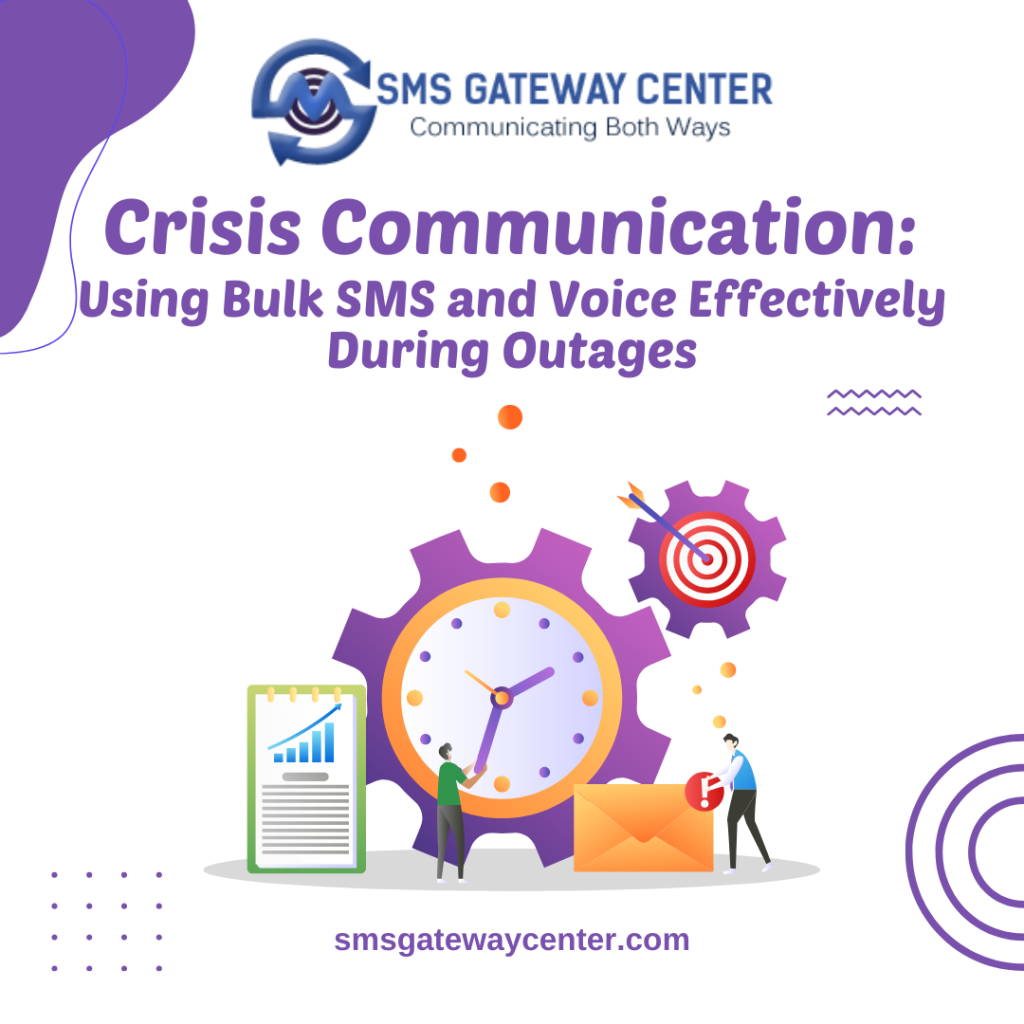Crisis Communication: Using SMS and Voice Effectively During Outages
In an era where uninterrupted services are critical to the success of businesses, unexpected outages or disruptions can create significant challenges. Whether it’s a power outage, system failure, natural disaster, or a technical glitch, effective crisis communication is the cornerstone of maintaining trust and mitigating negative impacts.
SMS (Short Message Service) and voice call solutions are two of the most reliable communication tools for crisis management. In this article, we will explore how businesses can leverage bulk SMS and voice communication to respond effectively during outages, ensure seamless communication, and safeguard their reputation.

Why Crisis Communication Matters
Crisis communication ensures that stakeholders are informed promptly and accurately during emergencies. Whether it’s employees, customers, or partners, keeping everyone informed builds trust and minimizes the spread of misinformation.
For businesses, outages can lead to frustrated customers, loss of revenue, and even damage to brand reputation. An effective communication plan that incorporates bulk SMS and voice messaging can significantly reduce these risks.
The Power of Bulk SMS in Crisis Communication
SMS is one of the most efficient and widely used communication channels during crises. Here’s why SMS is an essential tool:
1. Immediate Delivery
With an open rate of over 98% and most messages read within minutes, SMS ensures that critical updates reach recipients quickly.
2. High Reach
SMS works on all mobile devices, regardless of internet connectivity. This makes it an ideal choice during power outages or when internet services are down.
3. Customizable and Targeted Messaging
Messages can be tailored to specific groups, such as customers, employees, or partners, ensuring that the right people get the right information at the right time.
4. Cost-Effective
Compared to other channels, SMS is highly affordable, making it a preferred choice for businesses of all sizes.
How to Use Bulk SMS Effectively During Outages
- Send Immediate Alerts
When an outage occurs, send an initial alert to inform stakeholders about the issue. Keep the message concise and clear:- Example: “We are experiencing a temporary outage affecting our [service/product]. Our team is working to resolve it. Updates to follow. – [Your Company Name]”
- Provide Regular Updates
Keep recipients informed with regular updates on the progress of resolution.- Example: “Update: Our team is actively resolving the issue. Estimated restoration time: 2 PM. Thank you for your patience. – [Your Company Name]”
- Share Safety Tips or Alternatives
If the outage affects safety or usability, provide instructions or alternatives.- Example: “Due to the outage, please use [alternative platform/method] for urgent needs. Call us at [contact number] for assistance. – [Your Company Name]”
- Confirm Restoration
Once the issue is resolved, send a message to confirm and thank customers for their patience.- Example: “The outage has been resolved. All services are back to normal. We appreciate your understanding. – [Your Company Name]”
The Role of Voice Calls in Crisis Communication
While bulk SMS is powerful, voice calls add a personal touch to communication during critical situations. Voice calls are particularly effective when dealing with urgent or sensitive matters that require more detailed explanations.
1. Real-Time Communication
Voice calls enable real-time interaction, allowing businesses to address queries or provide step-by-step guidance.
2. Ideal for Emergency Instructions
In cases where safety is a concern, voice messages can deliver clear instructions, ensuring recipients understand the situation fully.
3. Personalized Outreach
For VIP customers or critical stakeholders, personalized voice calls can demonstrate care and commitment.
How to Use Voice Calls Effectively During Outages
- Broadcast Pre-Recorded Messages
Use pre-recorded messages to quickly inform large groups about the situation.- Example: “This is a message from [Your Company Name]. We are currently experiencing a service disruption. Our team is working to resolve it promptly. Updates will follow.”
- Interactive Voice Response (IVR) Systems
Implement an IVR system to handle incoming calls during outages. This can route customers to the right department or provide automated updates.- Example: “Press 1 for outage updates, Press 2 for support, Press 3 to leave a message.”
- One-to-One Calls for Key Stakeholders
For critical stakeholders, direct calls can provide detailed explanations and maintain trust. - Follow-Up After Resolution
After the crisis is resolved, use voice calls to express gratitude and reassure stakeholders.- Example: “We’re happy to inform you that the outage has been resolved. Thank you for your understanding.”
Best Practices for Crisis Communication with Bulk SMS and Voice
To maximize the effectiveness of your crisis communication, follow these best practices:
- Plan Ahead
Have a pre-defined crisis communication plan that includes message templates and escalation procedures. - Segment Your Audience
Identify and categorize your audience (e.g., customers, employees, partners) to send targeted messages. - Maintain Clarity
Keep messages simple, clear, and free of jargon. Ensure that instructions are easy to understand. - Provide Contact Information
Always include contact details for further assistance. This reassures recipients that help is available. - Test Your Systems
Regularly test your SMS and voice call systems to ensure they are ready to handle crises effectively. - Be Transparent
Honesty is key. If there’s a delay or complication, communicate it openly to manage expectations.
Why Choose SMSGatewayCenter for Crisis Communication
At SMSGatewayCenter, we offer robust and reliable bulk SMS and voice solutions tailored to meet your crisis communication needs. Here’s why businesses trust us:
- Scalable Infrastructure
Handle large volumes of messages and calls without delays or interruptions. - Advanced Features
Leverage features like message scheduling, audience segmentation, and real-time analytics. - 24/7 Support
Our dedicated team is available round-the-clock to assist you during emergencies. - Seamless Integration
Integrate our solutions with your existing systems for a unified communication strategy.
Conclusion
Crisis communication is not just about responding to emergencies; it’s about building trust and ensuring that your stakeholders feel informed and supported. By leveraging the power of bulk SMS and voice communication, businesses can navigate outages effectively, minimize disruptions, and maintain strong relationships with their audience.
SMSGatewayCenter is here to empower your crisis communication strategy with reliable and innovative solutions. Contact us today to learn how we can help you prepare for the unexpected.
Let us ensure that when a crisis strikes, your communication never falters.
Read More Articles:
The Curious Case of SMS Character Limits: Why Your Text Messages Have a Cap
How Bulk SMS Services Are Powering Local Businesses in Mumbai

